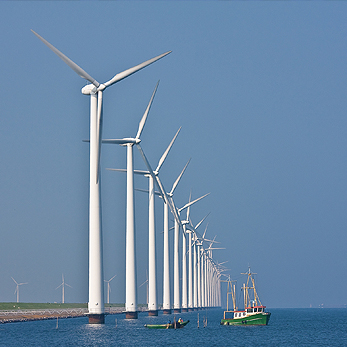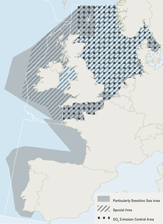What has been done?
OSPAR cooperates with other international bodies
The IMO is the competent international body regulating international shipping to protect the marine environment. OSPAR can refer to the IMO any shipping-related concerns regarding environmental protection within the OSPAR area.
OSPAR is following up commitments made at the North Sea Conferences. The North Sea Ministerial Meeting on the Environmental Impact of Shipping and Fisheries in 2006, resulting in the ‘Gothenburg Declaration’, reinforced the commitment of North Sea states to the ‘clean ship’ approach. This is a concept whereby vessels are designed, constructed and operated in a way that aims to eliminate harmful discharges and emissions during their working life. The clean ship approach has been followed up by some OSPAR countries through ‘green ship label’ initiatives.
OSPAR also works closely with the Bonn Agreement. This is the mechanism by which the North Sea states and the EU work together to detect and combat pollution from maritime disasters and chronic pollution from ships and offshore installations.
Recent international measures target impacts from shipping
The main international convention covering the prevention of pollution from ships is the MARPOL Convention and its thematic annexes I to VI. Annex II on noxious liquid substances carried in bulk was revised with effect from January 2007 to reduce the impact of cargo tank cleaning. Annex VI, relating to the prevention of air pollution, was amended in October 2008 to further reduce harmful emissions from ships. The International Convention for the Safety of Life at Sea (SOLAS) sets technical minimum standards for vessels and so reduces the risk of shipping accidents and thus accidental pollution.
Several priorities identified in the QSR 2000 are now addressed through legislation developed at the international level by the IMO. This includes the Convention on the Control of Harmful Anti-fouling Systems on Ships (2001) and the Convention for the Control and Management of Ships’ Ballast Water and Sediments (2004). OSPAR and the Helsinki Commission (HELCOM) have developed guidelines for managing ballast water, based on those of the IMO, which can be used on a voluntary basis, pending the ratification and entry into force of the IMO Ballast Water Convention.
In 2008, the IMO Marine Environmental Protection Committee developed a programme of work for minimising incidental noise from commercial shipping. It also began work on guidance for minimising the risk of ship strikes with marine mammals.
Following the loss of the Erika off the French coast in 1999, the EU adopted several Directives aimed at preventing accidents at sea and established the European Maritime Safety Agency (EMSA). The EU Blue Book on an Integrated Maritime Policy provides the framework for an integrated approach to managing marine activities, including shipping, and the environment.
Many of these measures have only been taken recently and it is too early to judge their effectiveness. In some cases, information is too limited to quantify the contribution of shipping to impacts such as oil spills or litter and to evaluate progress made since 1998. Improved monitoring of the development of impacts is therefore a priority.
Efficient surveillance, investigation and prosecutions are essential for the protection of the marine environment from pollution by shipping. The North Sea Network of Investigators and Prosecutors, a body associated with the OSPAR Commission and closely cooperating with the Bonn Agreement, was set up in 2002 to help enforce international pollution rules and standards in the North Sea. This is achieved through promoting effective use of evidence in the different national legal systems, comparable levels of penalties and exchange of information on convictions of offenders.
Special Areas and Particularly Sensitive Sea Areas
The IMO recognises that particular areas require a stricter regulatory regime for pollution from ships and management of shipping routes Figure 9.2:
- The North Sea was designated a Special Area under MARPOL Annex V in 1991. More stringent restrictions for discharges of garbage apply in this area.
- The North West European Waters were designated a Special Area under MARPOL Annex I in 1999 leading to more stringent restrictions on the discharge of oil and oily waste in this area.
- The North Sea was designated a Sulphur Oxides (SOX) Emission Control Area (SECA) under MARPOL Annex VI in 2007. Ships must comply with more stringent emission and fuel quality requirements if they want to pass through this area. Ships in the area are only permitted to burn low sulphur content fuel.
- The Wadden Sea and the Western European Waters were designated Particularly Sensitive Sea Areas (PSSAs) in 2002 and 2004, respectively, in recognition of their ecological, socio-economic or scientific importance.
Continue to "Shipping - Did it work? How does this affect the quality status?"


